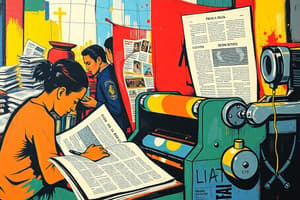Podcast
Questions and Answers
Which of the following is the most accurate definition of journalism?
Which of the following is the most accurate definition of journalism?
- The process of creating fictional stories for entertainment purposes.
- The collection, preparation, and distribution of news and related commentary through various media. (correct)
- The promotion of biased viewpoints regardless of factual accuracy.
- The act of writing opinionated articles for personal blogs.
The five core principles of ethical journalism are truth and accuracy, independence, fairness and impartiality, humanity, and accountability.
The five core principles of ethical journalism are truth and accuracy, independence, fairness and impartiality, humanity, and accountability.
True (A)
What is the significance of 'Acta Diurna' in the history of journalism?
What is the significance of 'Acta Diurna' in the history of journalism?
earliest known journalistic product
According to the journalist's creed, I believe that the public journal is a public ________.
According to the journalist's creed, I believe that the public journal is a public ________.
Which type of journalism involves in-depth reporting that aims to uncover social problems?
Which type of journalism involves in-depth reporting that aims to uncover social problems?
Yellow journalism is characterized by a commitment to unbiased reporting and factual accuracy.
Yellow journalism is characterized by a commitment to unbiased reporting and factual accuracy.
According to Gatung and Ruge (1981), what element determines if an event must be reported because it affects the lives of the audience?
According to Gatung and Ruge (1981), what element determines if an event must be reported because it affects the lives of the audience?
The principle of journalism that emphasizes that stories should be balanced and provide ___________ ensures readers receive a fair and comprehensive view.
The principle of journalism that emphasizes that stories should be balanced and provide ___________ ensures readers receive a fair and comprehensive view.
Match the following pillars of the Philippine justice system with their functions:
Match the following pillars of the Philippine justice system with their functions:
Which legal measure addresses online offenses such as illegal data interference, cyber fraud, and online libel?
Which legal measure addresses online offenses such as illegal data interference, cyber fraud, and online libel?
According to the provided text, in the Philippines, the media has faced libel cases but never any instances of red-tagging.
According to the provided text, in the Philippines, the media has faced libel cases but never any instances of red-tagging.
What term describes news stories that focus on individuals and their experiences in order to make the news relatable?
What term describes news stories that focus on individuals and their experiences in order to make the news relatable?
Stories that stress what is happening now, not past events, are showing __________.
Stories that stress what is happening now, not past events, are showing __________.
Which of the following poses a challenge to journalism due to easy and fast information spreading?
Which of the following poses a challenge to journalism due to easy and fast information spreading?
Match the type of news to whether it is scheduled or unscheduled:
Match the type of news to whether it is scheduled or unscheduled:
Flashcards
Journalism
Journalism
Collection, preparation, and distribution of news and related materials through print and electronic media.
Acta Diurna
Acta Diurna
The earliest known journalistic product; a news sheet circulated in ancient Rome.
Journalism as a sixth sense
Journalism as a sixth sense
A natural, seemingly inborn talent for recognizing what is newsworthy.
Journalism as a Mirror
Journalism as a Mirror
Signup and view all the flashcards
Journalism as a Story
Journalism as a Story
Signup and view all the flashcards
Interactive Journalism
Interactive Journalism
Signup and view all the flashcards
Investigative Journalism
Investigative Journalism
Signup and view all the flashcards
Science Journalism
Science Journalism
Signup and view all the flashcards
Drone Journalism
Drone Journalism
Signup and view all the flashcards
Yellow Journalism
Yellow Journalism
Signup and view all the flashcards
Independence in Journalism
Independence in Journalism
Signup and view all the flashcards
Humanity in Journalism
Humanity in Journalism
Signup and view all the flashcards
Truth and Accuracy
Truth and Accuracy
Signup and view all the flashcards
Accountability
Accountability
Signup and view all the flashcards
Data Journalism
Data Journalism
Signup and view all the flashcards
Study Notes
- Journalism involves collecting, preparing, and distributing news and related content
- This happens through print, electronic media, social networking, and broadcast forms
- Varying individual perspectives lead to different understandings and expectations of journalism
History of Journalism
- Acta Diurna,an early news sheet, circulated in ancient Rome
- In China's Tang dynasty, officials used court circulars or "reports"
- Tomas Pinpin, the Father of Filipino Printing, launched the first Philippine Newsletter, Successos Felices “Fortunate Events" in 1637
- Del Superior Govierno, the first Philippine Newspaper, launched on Aug 8, 1811
- La Esperanza was started in 1847
- Diario de Manila began in 1848
- 1877 marked the beginning of more opinionated journalism
- This started with the birth of La Opinion on April 1, 1887
- La Solidaridad, the mouthpiece of the Katipuneros, was founded on Feb 19, 1889
- El Heraldo de llollo began on Jan 1, 1898
- La Libertad began on June 20, 1898
- La Independencia was founded on Sep 3, 1898
- Manila Times, the oldest English language newspaper in the Philippines, was founded by Thomas Gowan, October 11,1898
- Ramon Roces is considered the Father of Modern Journalism
- Manila Tribune was another publication
- American Newspaper, one of the oldest existing newspapers, known as the Manila Daily Bulletin, started Feb 1, 1900
- Liwayway is the oldest magazine
- Manila Free Ph was the first post-liberation newspaper, published by a US officer during the war
Perspectives on Journalism
- Journalists often describe a news sense as a natural, innate talent
- Journalism is viewed as a phenomenon with volume and material dimensions
- Journalism contains daily news
- Journalism serves as a mirror, reflecting objective happenings in the real world
- Journalism is reflected in notion of news stories
- News requires nurture and careful handling
- Journalism serves the public interest and fosters trust
- A set of professional activities qualifies someone as a "Journalist" (may standard)
Journalism Perspectives from Scholars
- Journalism as Text: considers the public use of words, images, and sounds in patterned ways
- Journalism as People: defines journalism through those who work as journalists
- Journalism as Practice: focuses on the practical and symbolic dimensions of news practice
Types of Journalism
- Access Journalism: involves self-censorship to avoid embarrassing powerful entities
- Advocacy Journalism: aims to advocate particular viewpoints or influence public opinion
- Broadcast Journalism: is written or spoken for radio or TV.
- Business Journalism: tracks, records, analyzes, and interprets the business
- Citizen Journalism: known as participatory journalism
- Data Journalism: finds stories in numbers, using them to tell a story
- Drone Journalism: involves using drones to capture journalistic footage
- Gonzo Journalism: a highly personal reporting style championed by Hunter S. Thompson
Styles of Reporting
- Interactive Journalism: online journalism on the web
- Investigative Journalism: in-depth reporting that uncovers social problems
- Photo Journalism: stories told through images
- Political Journalism: covering all aspects of politics
- Science Journalism: focuses on science and technology
- Sports Journalism: covers sports
- Student Journalism: journalism by students
- Tabloid: light-hearted and entertaining; less legitimate than mainstream journalism
- Yellow Journalism (sensationalism): writing that emphasizes exaggerated claims or rumors
- War Journalism: reporting on war and armed conflicts
Role of Journalism in Society
- Journalism serves a key role in society
Core Principles of Ethical Journalism (TIFHA)
- Truth and Accuracy: Cardinal principle, prioritizing factual correctness
- Independence: Maintaining independent voices, free from special interests
- Fairness and Impartiality: Providing balance and context, acknowledging multiple sides within stories
- Humanity: Avoiding harm through journalism
- Accountability: Holding oneself responsible and professional
The Journalist's Creed
- Believing in journalism as a public trust and serving the public interest
- Upholding clear thinking, accuracy, and fairness
- Prioritizing truth and social welfare over suppression of news
- Maintaining ethical conduct and avoiding conflicts of interest
- Striving for journalism that is independent, constructive, tolerant, respectful, and just
Journalists' Code of Ethics
- Report news scrupulously, avoiding distortion or suppression
- Correct errors promptly
- Protect confidential information
- Practice fair and honest methods of news gathering
- Avoid personal motives or conflicts of interest
- Refrain from plagiarism and unethical behavior
- Avoid ridicule or discrimination
- Presume innocence, exercise caution with sensitive information
- Avoid unfair advantage over fellow journalists
- Uphold integrity and dignity, invoking conscience when necessary
- Maintain professional conduct and decency
Challenges of Journalism (TETOERADSABD)
- The Rise of Fake News: Rapid spread of misinformation challenging credibility
- Economic Pressure: Financial struggles for traditional news outlets
- Threats to Journalistic Independence: Corporate ownership, political biases, and external pressures compromising independence
- Oversaturation of Information: Overload of information
- Ethical Dilemmas: Navigating complex ethical decisions in reporting
- Rapid Technological Changes: Adapting to advancements
- Audience Fragmentation: Audiences dispersed across zones
- Diminishing Trust: Erosion of public trust in journalism
- Security Concerns: Risks faced by journalists
- Adaptation to New Storytelling: Adjusting to new info
Journalism Defined
- Gathering, recording, verifying, and reporting information of public importance
- News informs daily life, though a single definition is difficult due to various influencing factors
News Values (RTPUCEENPCC)
- Relevance: Impact on the audience's lives
- Timeliness: Current events
- Predictability: Scheduled events known in advance
- Unexpectedness: Unusual occurrences
- Continuity: Ongoing stories with repercussions
- Elite People: Stories about well-known individuals
- Elite Nations: Stories about developed countries
- Negativity: Focus on disasters, crime, and scandal
- Proximity: Impact on a specific audience
- Conflict: Opposing forces
- Currency: Timeliness of an idea
Sources of News (PNECLTCIMC)
- Press Releases: Prepared by PR professionals
- Newsroom Diaries: Seasonal or recurring events
- Emergency Services: Info from police, fire, or ambulance
- Charities and Pressure Groups: Promoting a certain cost
- Local Government: Government at all levels
- Trade Organizations: Representing specific trade workers
Journalism Techniques
- KISS (Keep It Short & Simple): concise writing style
- Experiment: Innovation in storytelling
- Story Construction: Inverted pyramid for non-chronological stories
- Answer questions: all 5Ws and 1H
- Use simple sentences
- Know audience when choosing words
- Punctuation is importnat
- Balance: good writing
Interviewing
- Ask "would I be interested in this story?"
- Think about the audience
- Interview the right people
- News in Brief: succinct reports
- Be concise
- Find the right interviewee
- Lines of questioning will be different based on interviewee
Difficult Interviews
- The death knock: speaking to relatives of the recently deceased
- Interviewing the elderly and children
Verifying Information
- Names need to beaccurate
Reporting
- Routines involve patterned practices and forms
- News is classified as hard, soft, spot, developing, and continuing
Journalists and The Law
-The Philippines is among the dangerous for journalists
- The CPJ reported 14 unsolved killings, Sep 1 2012 to Aug 31 2022
- The application of the franchise has been used to retaliate against media corporations -Heightened Red-tagging: labeling activists, journalists, and human rights workers
Basic Legal Concepts in the Philippines
- The Constitution: The fundamental and supreme law of the land
- Statutes: Acts of legislative (congress), municipal charters, municipal legislation (sanggunian) court rules, administrative rules and issues
- International Law: International principles or agreement with other territory or nation
Court System
- Justice System, Law enforcement, and Prosecution
- Parties show up before the court in proceedings, the court then offers a verdict
- Elements of the crime has to be proven
- Provable libel: causes dishonor, discredit or contempt, malice is presumed
- Penalties include imprisonment and fines
Cybercrime Prevention and Republic Acts
- R.A. 10175: cybercrime that criminalizes defamatory statements made online.
- R.A. 11479: anti-terrorism designed to prevent terrorism
Studying That Suits You
Use AI to generate personalized quizzes and flashcards to suit your learning preferences.




